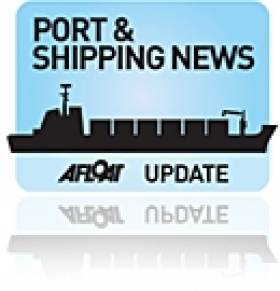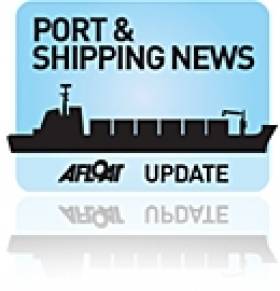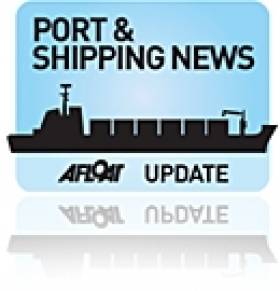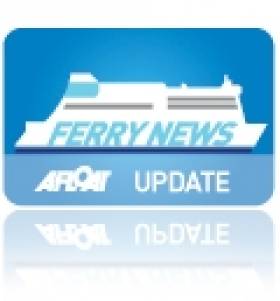Displaying items by tag: Irish shipping sector
#IrishShippingSector – Irish based shipping companies in 2012 experienced a challenging year with operations in both the domestic and international shipping markets, according to the Irish Maritime Development Office (IMDO).
Against this turbulent backdrop, the number of vessels being owned, controlled, managed and operated from Ireland remained steady at 340 vessels last year. The IMDO estimate that employment at these firms increased by 5% last year.
A key element in the overall stability of this segment of the Irish maritime sector has been the constant presence of the Irish Tonnage Tax regime which was the introduced in 2002.
Since the scheme began the IMDO has seen a reversal of a previous decline in the indigenous ship owning sector which has been followed by a steady growth and investment programme.
The scheme has gone from approximately 40 vessels to just over 300 vessels, owned, managed and operated by companies located in Ireland.
Latest data indicates that over 56% of the fleet is made up of dry bulk carriers, 21% tanker and 12% container with other Ro/Ro and other specialised vessels making up the remainder of the fleet.
The age profile of the fleet indicates that it is also a modern fleet with 70% of the vessels less than 10 years old and more than 52% under five years.
The industry's growth in Ireland has been driven both by established Irish shipping companies and also by foreign inward investment by overseas firms.
The Tonnage tax has made a positive economic contribution to Ireland and to the shipowning sector in Ireland. It has resulted in the creation of new jobs and investment opportunities for over 600 people and continues to grow.
The IMDO estimate that over €3 billion of shipping assets are managed and controlled from Ireland with more than 100 new direct jobs being created over the last three years alone.
In The Irish Times (dated 24 May) Top 1000 companies in Ireland this included a top 100 transport related companies.
The IMDO analysis indicates that 29 companies listed are engaged in shipping, ports and maritime logistics that had a combined turnover of €4.5bn employing 4700 people. Six Irish Shipping and leasing firms made the top 1000 companies last year.
Shipping Scene Highlights Busy Port of Drogheda
#BusyPort – Within the last 48 hours, Drogheda Port will have had nine cargoships that have either docked or lay at anchor, writes Jehan Ashmore.
The busy shipping scene is just a snapshot taken so far in early 2013 and follows the ports handling of more than 1m tonnes of cargo last year.
Export volumes and product types continue to increase as Irish companies seek to export and rely less on the home market. A number of specialist machine and metal fabrication products have recently been shipped from the port.
These nine cargoships have sailed across the Bay of Biscay and as far as the Baltic Sea and carrying a diverse range of imports and exports as outlined below.
Merle which arrived from Passajes, northern Spain with steel, Sergey Kuznetsov, a Russian flagged vessel berthed with bulk-cargo and Amazon Diep laden with timber.
A further three vessels, each loaded with bulk-cargos are the Sagabank, having sailed from Hamburg, Wilson Reef, owned by Norwegian owners and sailed from Rotterdam, while Nephrite had come from further afield having departed Klipeda in Lithuania.
The remaining trio of vessels all with export cargoes are Richelieu, which sailed from Liverpool to load machinery, Arklow Ruler, having transitted the Manchester ship canal, to load bulk cargo and Hohe Bank from Ayr to load fabricated units.
As demonstrated the shipping industry sector involves many ports, varying routes distances and variety of cargoes, not to mention the national backround of the ships themselves.
Port & Shipping Volumes Continue Slowdown in 3rd Quarter
#PORTS & SHIPPING- The volume of shipping and port traffic through the Republic of Ireland continued to decline during the third quarter of 2011, according to the latest analysis of traffic figures released by the Irish Maritime Development Office (IMDO).
Results from third quarter data indicate that only 1 of the 5 principal freight segments had any growth over the third quarter, while all other segments declined compared to the same period last year as outlined below in the key third quarter data:-
• Lift-on/Lift-off (lo/lo) trades were down 5%
• Roll-on/Roll-off export traffic was down by 2%
• Dry bulk volumes increased by 2%
• Break bulk volumes were down by 3%
• The Tanker/Liquid bulk market was down 7%.
For a more in-depth analysis of each freight-transport mode issued by the IMDO and accompanied by graphic charts click HERE. In addition to compare the 3rd quarter figures with the previous 2nd quater for this year click HERE.
Rosslare Europort to Host Irish Ports Conference
This year's Irish Ports Conference is to be hosted by Rosslare Europort on behalf of the Irish Port Association (IPA) and is to take place in Wexford on 30th September.
The event is the only one of its kind in Ireland this year where senior representatives from short-sea users, carriers, ports, logistics providers and the whole range of service providers meet to debate the topical issues of the day.
In addition the full-day conference provides those to network and explore further business opportunities and will culminate with the IPA's conference banquet.
The south-eastern ferry-port is to host delegates in the Ferrycarrig Hotel, just outside Wexford. For further information on booking and a (PDF) programme of the day visit the Rosslare Europort website by clicking HERE































































